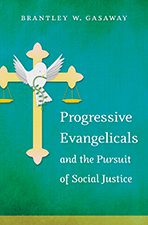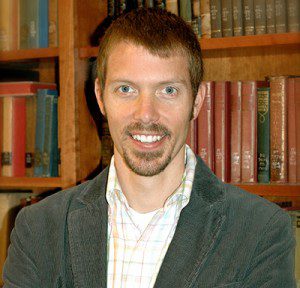 I’m delighted to bring you an interview with Brantley Gasaway, who teaches in the religious studies department at Bucknell University. He is the author of a new book Progressive Evangelicals and the Pursuit of Social Justice. We’ve known about each other for many years, ever since we learned we had written dissertations on the same subject. (I remember hearing about Brantley a month after I defended my dissertation.) But only recently did we meet each other in person. Brantley was directing a Bucknell-in-London program last spring when I participated in a conference in the UK on global evangelicalism. He showed wonderful hospitality.
I’m delighted to bring you an interview with Brantley Gasaway, who teaches in the religious studies department at Bucknell University. He is the author of a new book Progressive Evangelicals and the Pursuit of Social Justice. We’ve known about each other for many years, ever since we learned we had written dissertations on the same subject. (I remember hearing about Brantley a month after I defended my dissertation.) But only recently did we meet each other in person. Brantley was directing a Bucknell-in-London program last spring when I participated in a conference in the UK on global evangelicalism. He showed wonderful hospitality.
In addition to be a terrific guy, he’s written a terrific book. Brantley brings expert rhetorical analysis and a theological sensibility to bear on the subject of progressive evangelicalism. I admit to having felt a bit nervous about someone else working on the same topic at the same time I did. But it turned out to be a fascinating process. Our books turned out quite different, despite featuring many of the same characters. I think it is an intriguing study in how personality, methodology, discipline (mine history; his religious studies), background, and interest shape narratives.
I hope you enjoy Part I of this interview. After you read it, go order a copy of the real thing.
***
Swartz: How did you decide to pursue this research topic?
Gasaway: My interest in studying politically progressive evangelicals grew out of a combination of my personal background and professional questions. My family were members of a Southern Baptist megachurch as I grew up in North Carolina in the 1970s and 1980s. I do not remember my church’s leadership or the congregation as aggressively political—but I do remember the pervasive presumption that good, Bible-believing Christians should identify with the Religious Right and vote for Republicans. And although my religious and political views evolved while I attended and after graduating from the College of William & Mary, it was not until I eventually returned to North Carolina for my doctoral program at UNC-Chapel Hill that I first encountered the work of Jim Wallis and Sojourners, Ron Sider and Evangelicals for Social Action (ESA), Tony Campolo, and other progressive evangelicals.
I began wondering why I had never even heard of these theologically conservative Christians who promoted an evangelical public agenda that clashed with the Religious Right. I also wondered why the popular perception of evangelicals as reflexively Republican remained so strong. As a graduate student searching for a research focus, these questions eventually transformed into academic ones: how did the contemporary progressive evangelical movement develop, and what theological interpretations inspired participants’ activism and unusual combination of political positions?
Before I had done much formal research, in 2003 I attended an event hosted by ESA commemorating the 30th anniversary of the Chicago Declaration of Evangelical Social concern—an early manifesto of contemporary progressive evangelicalism. I heard Wallis, Sider, Campolo, Shane Claiborne and others speak; joined a memorable lunch conversation with John Perkins; and for the first time learned about The Other Side magazine and its place in the movement. I came home from the event convinced that I had found an underappreciated topic for my research. Little did I know that you were reaching the same conclusion at the same time!
Swartz: As I was writing Moral Minority, my least favorite joke was, “Ha—all three of them!” when I mentioned my research on the evangelical left. Did you hear similar comments, and if so, how did you respond? Why is progressive evangelicalism significant?
 Gasaway: Yes, I heard the same types of jokes. They usually came from other academic colleagues, so I responded by waving my arms dramatically and shouting something about “subverting the dominant paradigm.”
Gasaway: Yes, I heard the same types of jokes. They usually came from other academic colleagues, so I responded by waving my arms dramatically and shouting something about “subverting the dominant paradigm.”
But jokes aside, I would argue it is significant to understand the contemporary progressive evangelical movement for a number of reasons. At the most basic level, a focus on the leaders and groups whom I study sheds light on the complex and contested nature of evangelicals’ political priorities. But in a larger context, the activism of evangelical progressives is representative of the continued salience of religion in American public life. Indeed, the suspicion with which the more secular wing of the political left has viewed them illustrates ongoing debates regarding the role of religion in a liberal democracy. Finally, progressive evangelical leaders have offered constructive answers to what I regard as a fundamental challenge in American politics: as a society, how do we balance a commitment to both individual rights and the common good? I do not endorse all of the proposals that progressive evangelicals have offered, but I think that they have raised important questions and promoted public policies worth pondering.
Swartz: You use the term “progressive evangelicalism.” What are the virtues and limits of the term? Why that rather than “evangelical left”?
Gasaway: I think the labels “progressive evangelicals” or “evangelical progressives” best indicate the combination of participants’ religious identity and political orientation. As I write in my introduction, critics within the Religious Right have sought to stigmatize progressive evangelicals as “left” or “liberals” in their efforts to discredit them among evangelicals staunchly committed to both religious and political conservatism. Yet leaders, especially Wallis, chafed at this description. They claimed to promote “biblical” politics that challenged and ultimately transcended both the political right and left—think here of Wallis’s 2005 bestselling book that he boldly titled God’s Politics: Why the Right Gets it Wrong and the Left Doesn’t Get it. Thus it remained symbolically and substantively important for progressive evangelicals to resist any suggestion that they were ideologically and politically partisan—especially since leaders denounced the Religious Right for committing this very sin.
At the same time, the groups I focus on—Sojourners, ESA, and The Other Side—have clearly occupied the left side of the evangelical political spectrum since the early 1970s. Their focus on social justice issues traditionally associated political liberals and their sympathies for left-leaning policies to address these problems produced affinities for the political left. As a result, I do occasionally describe their movement as representative of the “evangelical left.” But, as your own book shows, the contemporary evangelical left comprised more groups than Sojourners, ESA, and The Other Side. I mention but do not treat in-depth those affiliated with the Christian World Liberation Front, the Reformed Journal, the Association (later Center) for Public Justice, and others.
Swartz: Although our books both analyze the evangelical left since the 1960s, they are different in important respects. How would you compare our two studies?
Gasaway: I think our works complement one another. As I read it, your book analyzes the genealogy of the evangelical left beginning in the mid-twentieth century; its trials in the 1970s and 1980s; and why, despite initial promise, it failed to take substantial shape electorally as the Religious Right rose in prominence.
But my book develops different lines of inquiry over a longer historical period. First, I take the history of progressive evangelicalism into Barack Obama’s presidency. Second, after an introductory chapter that traces the rise of the contemporary movement in the 1960s and early 1970s, I organize my work thematically. I have separate chapters that respectively analyze how progressive evangelical leaders responded to racism, feminism, abortion, homosexuality, economic injustice, and American militarism and nationalism from the 1970s into the twenty-first century. Finally, and perhaps most important, I demonstrate how progressive evangelicals’ distinctive biblical interpretations and public theology inspired their anomalous political engagement and distinguished them from both the Religious Right and political left. As a result, I have less of a biographical focus on leaders than you have. Instead, I concentrate on the theological convictions and cultural contexts that shaped progressive evangelicalism over the past four decades.











